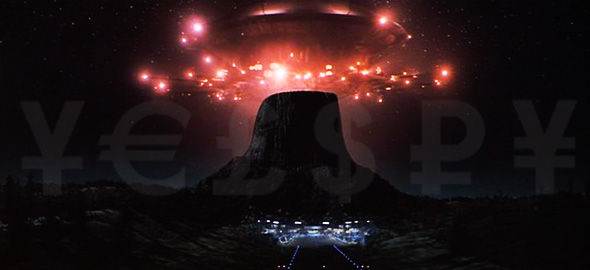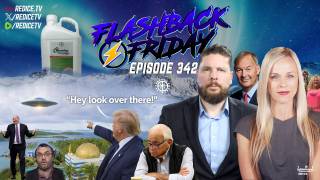Great News: "An Alien Invasion Would Save the Economy!"
Source: blacklistednews.com
Paul Krugman Wants Manufactured Threat From OuterSpace to Revive EconomyPaul Krugman wants to create a Keynesian-infused Space Alien Economic Bubble to revive the depressed one we have right now.
A new video from CNN has been released that openly admits this alien invasion would be FAKE! Are we being set up for a Project Blue Beam style false flag?
Dr Michio Kaku, renowned physicist, author and the apparent mouth piece for the scientific dictatorship that is the NWO, talks on the corporate media about the likely hood of an alien invasion.
Project Blue Beam is a very controversial subject and concerns the government carrying out a fake alien invasion to forward the agenda of creating their much sought after One World Government.
What better way to make the people surrender the last of their rights and freedoms then to be presented with an unbeatable enemy from another world??
The fact that Michio Kaku is on the corporate controlled media talking about it is enough to ring the alarm bells.
People watching this video and reading this quick article may well laugh at the mere suggestion of such a thing but i can tell you one thing, the elites that would carry it out sure as hell take it seriously.
And as ex Nazi and ex head of NASA once said …. “the last card, the last card we play will be a fake alien invasion”
Source: blacklistednews.com
Related: UFOs, Aliens, and the Question of Contact
Red Ice Radio
Steven Greer - ET: Friend or Enemy? Disclosure & Free Energy
Stephen Bassett - Official UFO/ET Disclosure
Richard Dolan - The Secret Space Program & Breakaway Civilization
Terje Toftenes - The Day Before Disclosure & The New Paradigm
Lloyd Pye - Starchild Skull DNA, Disclosure & Directed Panspermia
Can ‘Space Aliens’ Save Us?
Paul Krugman thinks so
From: antiwar.com

Why is the United States constantly at war? If we look at the last half century or so, there is hardly a time when we haven’t been engaged in some major conflict with a purportedly global threat to our very existence. The first such threat was Germany (on two occasions), and its Japanese fascist ally, two regimes whose appeal was nationally-limited and whose inherent instability would have defeated them in any case. The second such “threat” was the Soviet Union, and what Louis Bromfield derided as the “international psychopathic cult” of Marxist-Leninism – both of which collapsed under the weight of their own irrationality as the 1990s dawned.
For a while, there was no Major Threat in sight, and American politics soon reverted back to its pre-WWI “isolationist” slumber. With the drain on our economic resources stanched, investment – and its offspring, technological innovation – picked up: the US economy took off, and we enjoyed an era of prosperity. Unfortunately, this didn’t last long: a new Global Threat soon loomed over the horizon – Islamism!
The 9/11 terrorist attacks were a boon to the out-of-work War Party, and they certainly rose to the occasion: two wars, two ongoing military occupations, and a great swathe of the Middle East added to the American empire. And in just a few short years! Great work, except there’s a few problems: we’re bankrupt, saddled with a $14 trillion debt, the economy is tanking, the real unemployment rate is easily double the “official” rate of around 9 percent, and America has become Food Stamp Nation.
But don’t worry, Paul Krugman has the solution. Speaking with Fareed Zakaria on the news program GPS, he posited the following scenario, riffing off a comment by Harvard economist Ken Rogoff:
“Rogoff: ‘Infrastructure spending, if it were well-spent, that’s great. I’m all for that. I’d borrow for that, assuming we’re not paying Boston Big Dig kind of prices for the infrastructure.’
“Zakaria: ‘But even if you were, wouldn’t John Maynard Keynes say that if you could employ people to dig a ditch and then fill it up again, that’s fine, they’re being productively employed, they’ll pay taxes, so maybe Boston’s Big Dig was just fine after all.’
“Krugman: ‘Think about World War II, right? That was actually negative social product spending, and yet it brought us out. I mean, probably because you want to put these things together, if we say, “Look, we could use some inflation.” Ken and I are both saying that [Rogoff nods], which is, of course, anathema to a lot of people in Washington but is, in fact, what basic logic says. It’s very hard to get inflation in a depressed economy. But if you had a program of government spending plus an expansionary policy by the Fed, you could get that. So, if you think about using all of these things together, you could accomplish a great deal.’
“’If we discovered that space aliens were planning to attack and we needed a massive buildup to counter the space alien threat and really inflation and budget deficits took secondary place to that, this slump would be over in 18 months. And then if we discovered, oops, we made a mistake, there aren’t any aliens, we’d be better –‘
“Rogoff: ‘And we need Orson Welles, is what you’re saying.’
“Krugman: ‘No, there was a Twilight Zone episode like this in which scientists fake an alien threat in order to achieve world peace. Well, this time…we need it in order to get some fiscal stimulus.’”
The word fake is key to understanding Krugmanian economics, which is what passes for liberal or “progressive” economics these days: Krugman believes, like Keynes, that, as Zakaria put it, you can eliminate unemployment by paying people to dig a ditch and fill it up again. It doesn’t matter if workers are engaged in productive activities, according to the Keynes-Krugman crankery, what matters is that they’re in motion, and getting paid to make those motions by the US government.
War, too, puts men in motion, although it’s not the sort of activity one usually associates with productivity – but you’re thinking in the old-fashioned way, which insists on associating economic success with producing products that people want to buy. Instead, Krugman associates prosperity with government as the sole source and producer of wealth via the government printing press. All we have to do, says Krugman – and Rogoff, who did not dissent – is put the pedal to the metal and churn out more dollars. Then we can pay people to dig holes and fill them up again – or, perhaps, blast holes in Iran’s infrastructure and then pay military contractors to “nation-build” once we get in there with the US Army.
Krugman’s canard about how World War II dragged us out of the Great Depression has been debunked by economists on both the right and the left, but plain common sense should alert the non-expert reader to the illogic of this view, let alone its complete lack of any moral sense. Essential goods and services were strictly rationed during the war years, and the relaxation of wartime regulations and controls was bound to create an economic upswing relative to what had gone before. Secondly, the rest of the Western world lay in ruins in the aftermath of the war, while the continental US was spared: this above all explains the postwar economic boom.
According to Krugman and his “progressive” co-thinkers, if the US engaged in constant warfare, and employed the non-military population in the “work” of digging holes and filling them back up again, we could achieve permanent prosperity. Just keep those government printing presses – or, today, pixels on a computer screen – running at top speed. Contemplating Krugman’s farrago of fiscal fallacies, I can’t help but think of Garet Garrett’s prescient remark, made in 1950, that
“War becomes an instrument of domestic policy. Among the control mechanisms on the government’s panel board now is a dial marked War. It may be set to increase or decrease the tempo of military expenditures, as the planners decide that what the economy needs is a little more inflation or a little less — but of course never any deflation. And whereas it was foreseen that when Executive Government is resolved to control the economy it will come to have a vested interest in the power of inflation, so now we may perceive that it will come also to have a kind of proprietary interest in the institution of perpetual war.”
Many conservatives who are now coming to question the vast expenditures it takes to maintain our overseas empire of bases and “interests” do so in the name of fiscal austerity. However, lurking just beneath the surface of this economic objection is the suspicion that the Warfare State is just another aspect of the Janus-faced Welfare State – and that one makes the other possible. Krugman’s remarks confirm this, which is why one should always listen very carefully to one’s political enemies.
War and inflation are the twin Harpies, the twin miseries of the modern world, and it’s no accident – as the old-timey Marxists used to say – that the advent of modern warfare, the Great War, was visited upon the world at the same time the US Federal Reserve came into existence.
How else could one wage warfare on that kind of unprecedented scale without expending unprecedented sums of money – conjured out of thin air? The Fed gave the War Party a blank check – which they proceeded to cash, and are still cashing, rolling up record deficits.
“War becomes an instrument of domestic policy” – the conservative Garrett, a former editor of the Saturday Evening Post and a stalwart of the pre-WWII opposition to the New Deal, saw the Age of Obama coming from a long way off. Now that the distant threat has become a teetering colossus of empire threatening to fall in on our heads, Garrett’s fellow conservatives (who were deaf to his warnings at the time) are waking up to the threat. Have they awakened in time to avert disaster? I would say: more than last year, but not enough, at least not yet.
I frankly don’t see much of a political solution at the moment, although there are signs that the anti-interventionist impulse in American politics is gathering momentum. The two most powerful – and very often allied – Washington lobbies, the military-industrial-congressional complex and the Israel firsters, are determined the US will continue to spend more on the military than all other nations on earth combined – and they will get their way. They’ll get it because they have a vise-like grip on the political establishment, but that’s just one aspect – and not the central cause – of the problem.
The real mechanism that powers the war machine is the Fed, a “privately-owned” [.pdf] central bank which operates independently of Congress and yet enjoys a government-enforced monopoly on the issuance of currency. The Fed can “monetize” the debt simply by pushing a button on the government’s control panel, as Garrett pointed out, and the President can push another one marked “War” – and all without congressional approval.
Oh, the wonders of “democracy”! If that doesn’t make you proud to be an American, then I don’t know what will.
The short-term prospects for peace and liberty are, frankly, awful: that the ruling elite is considering war as a “solution” to our economic troubles is an option I wouldn’t rule out by any means. Krugman has said this kind of thing before, to illustrate his point, always followed by some attempt to distance himself from the moral nihilism of the “war-is-good-for-the-economy” doctrine. I’m not sure, however, that this squeamishness is necessarily shared by the folks who are running this country, either now or in the very near future – as I’m sure Krugman realizes.
I would also correct him on his details: it wasn’t Twilight Zone, but The Outer Limits that “The Architects of Fear” – the episode Krugman refers to – appeared on. In the original story, the scientists plotting their hoax create a fake “alien” from among their own number, who undergoes surgery and is then launched into space. That’s when things start to go wrong: the “space vehicle,” which is supposed to land in front of the United Nations, instead crash lands in woods near his lab, where he runs into some hunters and is mortally wounded. He staggers into the lab, where his wife has gone looking for him – and he dies in her arms in the moment she realizes he’s her husband and not some monster. The episode ends with this narration:
“Scarecrows and magic and other fatal fears do not bring people closer together. There is no magic substitute for soft caring and hard work, for self-respect and mutual love. If we can learn this from the mistake these frightened men made, then their mistake will not have been merely grotesque, it would at least have been a lesson. A lesson, at last, to be learned.”
In the end, “The Architects of Fear” is about how the best-intentioned among us – in this case, a bunch of “peace-loving” “progressive” scientists – can embark on a course that leads straight to disaster. It is a little morality tale that pointedly underscores our modern dilemma, although not in the way Krugman intended. The scarecrows of the various external “threats” – the Germans, the Russians, the Arabs – and the “magic” of the Fed’s money-creation machine have kept us in a state of constant warfare and economic dislocation, with no relief in sight. Is there hope? Yes, but only if you take the long view.
The central cause of the boom-bust-war cycle is the Fed, which is the motor of the war machine and the creator of the economic bubble that always ends in a painful bursting. Until it is ended, or at least reined in, the buttons marked “inflation” and “war” are going to remain on the government’s control panel – begging to be pushed.
Short of ending the Fed, however, there are definite steps we can take to alleviate the consequences of these structural problems that will continue to bedevil us until either hell freezes over or the revolution comes. While doing everything we can in terms of electoral politics, we should not and must not forget the educational aspect of our campaign for a more peaceful and freer world. That is our mission, here at Antiwar.com, and it’s the only way forward for those who dream of a better day.
For over fifteen years, we’ve been at the forefront of the battle against the War Party, and we’ve had our ups and our downs. In the post-9/11 war hysteria, we stood alone against the overwhelming current of public opinion and warned against an over-reaction that would involve us in a series of futile, expensive, and essentially unwinnable wars. History has since proven us right, the tide of public opinion has since turned – and still we are here, exposing the War Party’s schemes and debunking the propaganda that flows from Washington non-stop.
We don’t have the tremendous – indeed, bottomless – resources of the War Party: we can’t print money. They can. What we can do, however, is to appeal to our readers and supporters – you – for the funding we need to continue our work. We can’t tax you – and wouldn’t if we could. We can only ask that you make a tax-deductible donation to help keep the War Party at bay.
That’s all we can do, short of effecting “regime-change” in Washington: keep them at bay, restrain them and rein them in, via pressure from below. And the only way to exercise that pressure is to educate the American public about the realities of US foreign policy. That is the task we have set for ourselves. Progress comes, and then there are setbacks, but all in all we’ve been making steady gains, especially among those who were formerly not reachable: conservatives who are beginning to see the fiscal crisis as a crisis of empire.
The main stumbling block to an anti-interventionist candidate like Ron Paul, for example, is the continuing ignorance and archaic views of those remaining conservatives – the majority – who still cling to their militaristic views, which are largely a legacy of the cold war. This is changing, however, albeit not fast enough – and you can quicken that change by helping to support this web site.
Politics isn’t everything: indeed, successful political action is only the end result of a sustained educational effort – and that is what Antiwar.com is all about. Today is the first day of our Autumn fundraising drive, as you’ll note if you go to the front page, and we are facing rising costs and a significantly impoverished readership – because all of us are impoverished, these days, except for the arms manufacturers and their lobbyists, who are doing just fine. I frankly have been dreading the start of the drive for weeks: with the economy in the shape it’s in, the thought of going to the readers, one more time, and asking for their help is daunting, to say the least. Yet it must be done: because the question of war and peace is the most vital issue of our time, the resolution of which is the key to winning the battle for fiscal sanity and recovering our economic health.
Source: antiwar.com






















